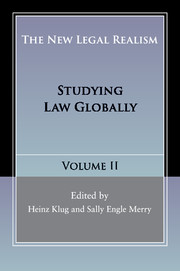Book contents
- Frontmatter
- Dedication
- Contents
- List of contributors
- Preface to The New Legal Realism, Volumes I and II
- 1 Introduction
- Section I The Globalization of Law
- Section II The Global Transfer of Norms
- 5 Colonizing the Clinic: The Adventures of Law in HIV Treatment and Research
- 6 The Politics of Islamic Law and Human Rights: Sudan's Rival Legal Systems
- 7 Women Seeking Justice At the Intersection Between Vernacular and State Laws and Courts in Rural KwaZulu-Natal, South Africa
- Section III global institutions and the changing roles of judges and lawyers
- Section IV Global Justice
- Index
- References
6 - The Politics of Islamic Law and Human Rights: Sudan's Rival Legal Systems
from Section II - The Global Transfer of Norms
Published online by Cambridge University Press: 05 May 2016
- Frontmatter
- Dedication
- Contents
- List of contributors
- Preface to The New Legal Realism, Volumes I and II
- 1 Introduction
- Section I The Globalization of Law
- Section II The Global Transfer of Norms
- 5 Colonizing the Clinic: The Adventures of Law in HIV Treatment and Research
- 6 The Politics of Islamic Law and Human Rights: Sudan's Rival Legal Systems
- 7 Women Seeking Justice At the Intersection Between Vernacular and State Laws and Courts in Rural KwaZulu-Natal, South Africa
- Section III global institutions and the changing roles of judges and lawyers
- Section IV Global Justice
- Index
- References
Summary
Introduction
Shortly after the end of Sudan's twenty-three year civil war in 2005, I visited an encampment for displaced survivors in the desert near Khartoum, Sudan's capital. At the time I was traveling with a small group of lawyers from the United Nations (UN). A sultan (local customary leader) greeted us and asked whether we sought information from his community to conduct “a needs assessment,” as he put it, or whether we sought to provide assistance. His people required resources like clean water, schools, and money, he said, but foreigners visit, ask questions, and do not return. A member of the UN delegation responded that, as lawyers, the team could provide legal resources. She asked the sultan whether his community needed lawyers. He responded that he did not think lawyers would be able to help.
So goes the experience of human rights law among those displaced by war, refracted by encounters with aid agencies offering legal solutions to the cycle of poverty. And, I argue, so also goes their experience of law under Sudan's successive military governments. Just as aid activists promote a universal and immutable interpretation of human rights law, the Sudan government, particularly since 1989 under President Omar al-Bashir, has promoted its own interpretation of an immutable law, rooted in Islam. Viewed from the perspective of marginalized persons displaced by civil war, then, human rights and Islamic law offer competing narratives of legal order, salvation, and protection. But they do so only when one submits to a system of institutions and ideas configured and dominated by elites and outsiders, while rejecting the competing system.
In Sudan, a parallelism exists between the unitary and top-down character of law in the state's uses of religious law and the international aid community's uses of human rights law. Citizens experience the force of an authoritarian government advancing Islamic law to preserve the state, and they interact with aid agencies advancing human rights law to liberate citizens from the state's harmful actions. This chapter offers an empirically grounded analysis of these two rival discourses as they are presented to the survivors of civil war. My analysis draws on fifteen months of research in Sudan and fifty-seven semistructured interviews with officials, lawyers, and activists, along with ethnographic observations from encampments for those displaced by war.
- Type
- Chapter
- Information
- The New Legal RealismStudying Law Globally, pp. 96 - 112Publisher: Cambridge University PressPrint publication year: 2016
References
- 1
- Cited by



